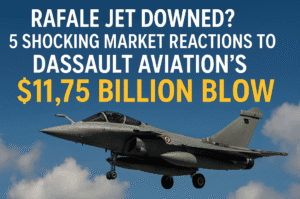Rafale Jet Downed? 5 Shocking Market Reactions to Dassault Aviation’s $11.75 Billion Blow
Dassault Aviation’s shares fell 3.3% after Pakistan claimed to have shot down Indian Rafale jets during recent border clashes, marking the first potential combat loss for the French-made fighter. While India has not confirmed the losses, a French intelligence official acknowledged at least one Rafale may have been downed, sparking investor concerns over the jet’s battlefield reputation. The dip contrasts sharply with China’s Chengdu Aircraft Corporation, whose shares surged over 30% as its JF-17 jets—used by Pakistan—gained attention.
The incident underscores how geopolitical conflicts can sway defense markets, where perception often outweighs verified outcomes. For Dassault, reputational risks loom, particularly among nations eyeing Rafale purchases, though historical parallels suggest recovery hinges on transparency and proven performance. Meanwhile, the clash highlights shifting defense alliances, with Chinese-Pakistani collaboration gaining momentum. As investigations unfold, the focus remains on whether Dassault can reassure global clients and maintain its edge in an increasingly competitive arms trade.

Rafale Jet Downed? 5 Shocking Market Reactions to Dassault Aviation’s $11.75 Billion Blow
The escalating tensions between India and Pakistan have reverberated beyond the battlefield, sending ripples through global defense markets. French aerospace giant Dassault Aviation saw its shares fall 3.3% over two days following Pakistan’s assertion that it shot down multiple Indian fighter jets—including advanced Rafale aircraft—during recent cross-border clashes. The drop, from $373.8 to $362.05 per share, underscores how geopolitical conflicts can swiftly influence investor confidence in defense contractors.
Conflict Context and Unverified Claims
Pakistan’s military reported downing five Indian jets, three of which were purportedly Rafales, during India’s “Operation Sindoor,” a retaliatory strike targeting alleged militant camps. While Indian authorities have remained silent on these claims, a French intelligence official reportedly confirmed to CNN that at least one Rafale was lost—a significant milestone, as it would mark the first combat loss for the jet since its debut in 2001.
The Rafale, lauded for its versatility and deployed by six nations, has maintained an untarnished combat record in missions across Libya, Mali, and Syria. Its perceived invulnerability has been a selling point for Dassault, making this incident a potential reputational test.
Market Reactions: Winners and Losers
The reported downing had immediate financial repercussions:
- Dassault’s Dip: The 3.3% decline reflects investor concerns over the Rafale’s battlefield efficacy. While modest, the drop highlights how operational setbacks—even unconfirmed ones—can sway markets. Defense stocks are particularly sensitive to real-world performance, as perceived weaknesses may impact future export deals.
- Chengdu Aircraft’s Surge: Shares of China’s Chengdu Aircraft Corporation (CAC), manufacturer of Pakistan’s JF-17 Thunder jets (reportedly involved in the skirmish), surged over 30%. This spike suggests investor optimism in CAC’s technology, though it’s worth noting that CAC is a subsidiary of the state-owned AVIC, which complicates direct stock market comparisons.
Broader Implications for Defense Industries
- Reputation and Export Dynamics: A confirmed Rafale loss could prompt current and prospective buyers (like Indonesia and the UAE) to scrutinize its combat readiness. However, context matters: If the jet was overwhelmed by numerical superiority or ground defenses rather than outperformed in air combat, the long-term impact might be muted.
- Competitive Edge: The incident may boost interest in alternatives like the JF-17 or U.S.-made F-35s, particularly among cost-conscious nations. CAC’s rise, albeit partly speculative, signals growing confidence in Chinese-Pakistani defense collaboration.
- Investor Psychology: Defense markets often react sharply to conflict narratives, prioritizing perception over verified data. Dassault’s recovery may hinge on transparent investigations into the incident and demonstrated Rafale resilience in subsequent operations.
Historical Parallels and Lessons
Past conflicts show that initial market reactions can be disproportionate. For instance, Lockheed Martin’s stock dipped temporarily after an F-117 stealth fighter was shot down in Serbia in 1999, but long-term contracts remained unaffected. Similarly, Dassault’s fortunes may stabilize if the Rafale’s overall track record and upgrades reassure clients.
The Road Ahead
As France investigates the incident, key questions linger:
- Will India, which plans to acquire 114 new fighter jets, reconsider its reliance on Rafales?
- How will Dassault address potential concerns about the jet’s survivability in contested airspace?
- Could this incident accelerate shifts in global defense partnerships, particularly in Asia?
For now, the situation remains fluid, with unverified claims and geopolitical posturing driving headlines. Investors and analysts alike will monitor how Dassault navigates this challenge—and whether the Rafale’s market allure proves as durable as its combat legacy.
In a world where perception often shapes reality, the defense sector’s next moves will hinge on transparency, adaptability, and the cold calculus of performance under fire.
You must be logged in to post a comment.